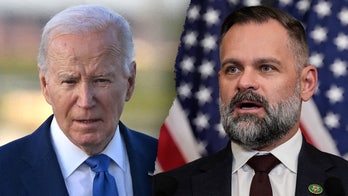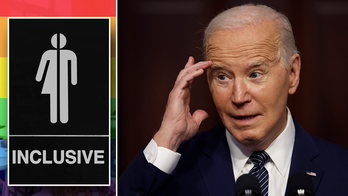![fbcbd0e5-[]](https://a57.foxnews.com/static.foxnews.com/foxnews.com/content/uploads/2018/09/1200/675/jenniferkorn.jpg?ve=1&tl=1)
(DC Corporate Headshots)
A Republican strategist who led President George W. Bush’s Hispanic outreach in his 2004 re-election campaign is the new Deputy Political Director for the Republican National Committee.
Jennifer Sevilla Korn, whom the RNC noted was at the helm of Bush’s Latino campaign when he got a strong 44 percent of the Latino vote – a sizable amount for a Republican candidate – also will be the organization’s National Field Director for Hispanic Initiatives, according to a Tuesday announcement by the GOP group.
The selection of Korn comes at a time when the Republican Party is regrouping to avoid another election – particularly at the presidential level – where Latino voters overwhelmingly support the Democratic candidate. In the 2012 election, Latinos gave 71 percent of the vote to President Barack Obama, but only 27 percent to his GOP challenger, former Massachusetts Gov. Mitt Romney.
“Jennifer will play a key role in directing our Hispanic engagement efforts to ensure that Republicans are building new relationships in the Hispanic community,” said RNC Chairman Reince Priebus in a statement. “Jennifer will help us continue to meet the goals set in the Growth and Opportunity Project of building an inclusive and diverse party.”
For several years, Korn has been executive director of the center-right Hispanic Leadership Network, which has pushed for a moderate Republican approach to immigration reform.
In January, Korn sent a widely publicized primer to Republicans on what terms to use, and what to avoid, when talking about immigration.
She urged Republican political leaders to stay away from terms like “aliens,” “anchor babies,” and “amnesty” – loaded words that are described as divisive and counterproductive.
Instead, the memo said, “When talking about immigrants…use ‘undocumented immigrant’ when referring to those here without documentation.”
Many Latino voters, who of course are U.S. citizens, cited the hard-line rhetoric by Romney, and many others in the Republican Party, concerning immigration as a factor that contributed to their sense of alienation from the GOP.
In polls, Latino likely voters said that even while immigration ranked behind other issues, such as jobs, the economy and education, among their priorities, they still paid close attention to the manner in which political candidates approached the issue.
“We have been successful in the past, and I know we can be successful in the future,” Korn said in a statement about her new role with the RNC. “I intend to work arduously to reach new heights in growing the Republican Party, and building a Hispanic effort from the RNC that truly reflects the bonds that unite our party and Latinos across the country.”
Korn was National Hispanic Director and Southwest Coalitions Director for the Bush-Cheney presidential campaign in 2004. In the Bush administration, she served as Director of Hispanic and Women’s Affairs, Director of Intergovernmental Affairs and Public Liaison for U.S. Department of Justice.
Earlier this year, she addressed the Conservative Political Action Conference, or CPAC, where she pushed for comprehensive immigration reform, which would include tighter border security and a pathway to legalization for undocumented immigrants.
Many conservatives oppose a pathway to legalization, considering it amnesty, and a reward for law-breakers. Those who support it – they include many Republicans – say it is not practical to expect that the estimated 11 million undocumented immigrants in the country will be tracked down and deported.
"You can be conservative and be for immigration reform,'' Korn told the CPAC crowd. A guest-worker program, for instance, she said, "helps our business, it helps our economy, and it is something big labor is against.''
Korn said in an interview with Fox News Latino earlier this year that the loaded language of some Republicans last year ended up as a political weapon for the Democrats.
Within the Hispanic community, there are certain buzz words, a harsh tone, that doesn’t help the debate [on immigration], she said.
“What President Obama did was take all those messages and use them against all conservatives,” said Korn. “Within the Hispanic community, there are certain buzz words, a harsh tone, that doesn’t help the debate.”
It hurts Republicans, and distorts their image, Korn said, when some “talk and have a knee-jerk reaction to ‘amnesty,’ and don’t explain what it is you’re for, what are your solutions.”
Some proponents of strict immigration enforcement say that efforts to soften rhetoric is nothing more than "political correctness." They say will continue to use the controversial terms.
“Amnesty means a full pardon without penalty,” said Korn in her interview. “People think we’re just going to hand them citizenship and let them get ahead of people who have been waiting 10, 15 years to come legally.”
But not only is that offensive, it is misleading, Korn said. When Republicans throw out such terms, it encourages opposition to an idea, even when that is not the GOP lawmaker’s intention, she said.
The bipartisan immigration reform bill pending in the U.S. Senate would allow a path to legalization only if a person meets a broad set of criteria, Korn said.
“You have to pass a background check, have to learn English, and then you get a provisional visa,” she said. “We like to say ‘earned legal status,’ because that is what it is.”
“It’s more constructive to come up with, and offer, solutions than to oppose every idea for immigration reform that comes out,” she said. “When you accurately explain what something is, and say earned legalization instead of amnesty, people say they overwhelmingly support it.”




